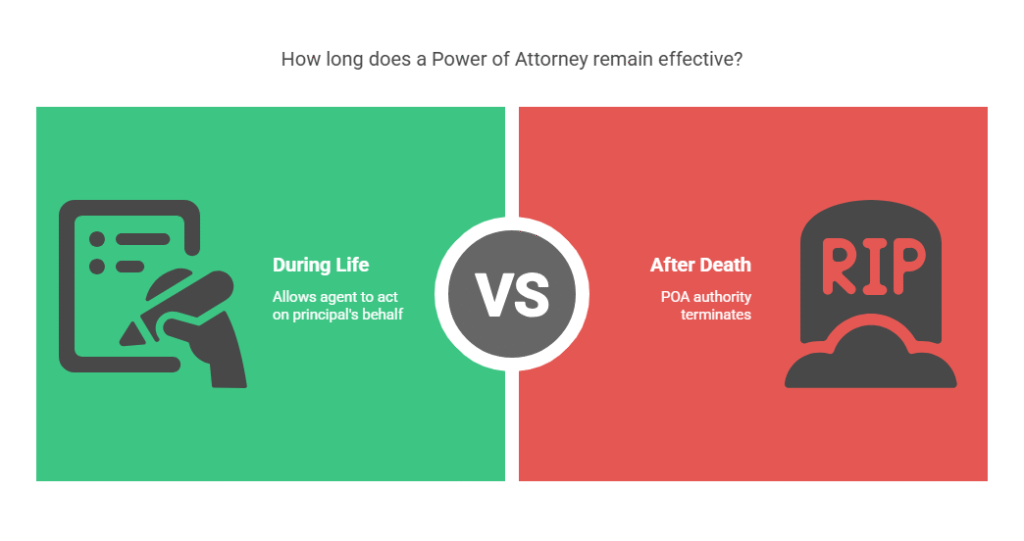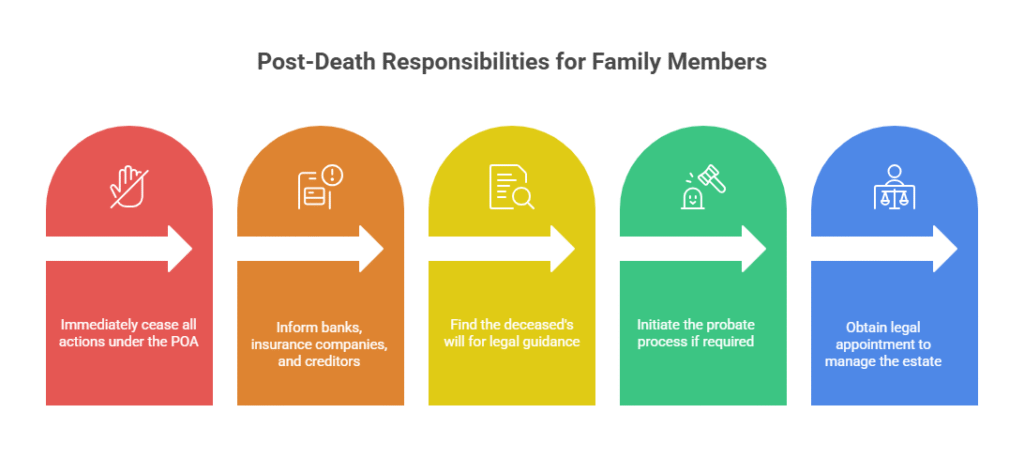Power of Attorney
A Power of Attorney (POA) is a legal document that gives someone (called an agent or attorney-in-fact) the authority to act on behalf of another person (the principal). It’s incredibly useful during illness, disability, or absence. But many people don’t realize that its power has a time limit—and that limit is death. Law of Resonance

Why It’s Important to Know When It Ends
Knowing when a POA becomes invalid is essential. Misusing it after the principal has passed away can lead to legal consequences, even if it’s done with good intentions. Understanding this cutoff point helps avoid confusion, fraud, and delays in settling the deceased’s affairs.
Legal Definition and Function of Power of Attorney

What Does a Power of Attorney Do
A Power of Attorney allows the agent to:
- Pay bills
- Manage real estate
- Handle bank accounts
- Make legal and financial decisions
The powers can be broad or limited, depending on the document’s terms.
Types of Power of Attorney

- General POA: Covers a wide range of decisions
- Limited POA: Grants power for specific tasks
- Durable POA: Remains valid if the principal becomes incapacitated
- Medical POA: Covers health-related decisions
Regardless of type, all POAs expire at the same moment—the principal’s death.
When Power of Attorney Ends
The Legal Moment It Becomes Invalid
A Power of Attorney is valid only while the principal is alive. As soon as the principal dies, the POA immediately terminates—no matter what’s stated in the document.
Why POA Ends at Death
A POA is designed to act on behalf of a living person. After death, the individual’s legal rights shift to their estate, and the executor (appointed by a will or court) becomes responsible.
What Happens to the Agent’s Authority

The agent no longer has any legal right to:
- Access bank accounts
- Sell or manage property
- Make medical decisions
- Sign contracts or documents on behalf of the deceased
Trying to act under POA after the principal dies is illegal and can be considered fraud.
Misconceptions About POA After Death
Common Myths Explained
- Myth: “The POA is still good until the estate is settled.”
Truth: It ends the moment of death. - Myth: “I’m the POA, so I can keep managing their stuff.”
Truth: Not after they pass. You need court authority.
Difference Between POA and Executor
- POA = Agent for a living person
- Executor = Legal representative after death
If the deceased had a will, the executor named in it takes over. If not, the court appoints one through the probate process.
Legal Alternatives After Death
Role of a Will
A Last Will and Testament names the person responsible for managing the estate. This person must be approved by the probate court before acting on behalf of the deceased. John Spencer Attorney Profile
Duties of an Executor
The executor’s role includes:
- Paying debts and taxes
- Distributing property
- Managing estate accounts
- Carrying out the wishes in the will
They step into the legal role after the POA ends.
Probate and Estate Administration
Probate is the process by which a court oversees the distribution of the deceased’s estate. It’s also when the executor is officially given authority. This is how legal power continues—through court, not POA.
What to Do After Someone Dies

Steps to Take as a Family Member or Agent
- Stop using POA immediately
- Notify the bank, insurance, and creditors
- Locate the will
- File for probate (if necessary)
- Get appointed as executor or administrator
Securing Legal Authority Post-Death
If you’re not named in the will, you’ll need to apply to the court for letters of administration. This is the only way to legally manage assets or close accounts.
How to Prepare for the Future
Create a Comprehensive Estate Plan
Include both a POA (for while you’re alive) and a will (for after your death). They serve different purposes but work together for full coverage.
Appointing an Executor Separately from POA
Sometimes people appoint the same person as both agent and executor—but that doesn’t happen automatically. You must name them separately in both documents.
When to Seek Legal Help
If there’s any confusion, it’s best to consult an estate planning attorney. They can ensure documents are correctly drafted and legally valid, avoiding family disputes later on.
Conclusion
So, is a Power of Attorney valid after death? The answer is a clear no. As powerful as a POA may be during life, it becomes immediately invalid upon the death of the principal. That’s when the executor or court-appointed administrator takes over. Understanding this legal boundary can help you avoid missteps and ensure a smoother transition in managing your loved one’s estate. Alan Abramson lawyer
FAQs
Can I still use a POA after the person dies?
No. A Power of Attorney ends immediately upon death. Using it afterward is illegal.
Does durable power of attorney stay valid after death?
No. Even a durable POA becomes invalid at the moment of the principal’s death.
Who takes over when POA ends at death?
The executor of the estate, if named in a will. Otherwise, the court appoints an administrator.
How is an executor different from a POA?
A POA represents the person while alive; an executor manages affairs after death.
Can I be both an agent and executor?
Yes, but only if you are named as both in the POA and the will. They are separate roles.

Comments
[…] Public perception of Keith Adams is largely positive. Many see him as a fearless defender of justice, willing to take on tough cases regardless of public opinion. His professionalism and commitment have earned him respect both inside and outside the courtroom. Is a Power of Attorney Valid After Death […]
[…] Understanding Power of Attorney vs Conservatorship is crucial when planning for the future or helping a loved one in crisis. While both tools aim to protect vulnerable individuals, POAs offer more flexibility and autonomy, while conservatorship provides a court-supervised safety net for those who can no longer make decisions on their own. The best choice depends on the specific circumstances and timing. Is a Power of Attorney Valid After Death […]